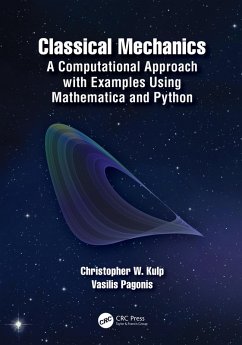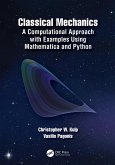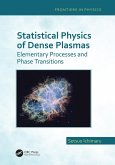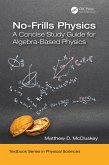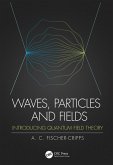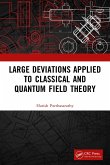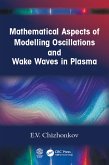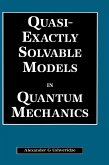Christopher W. Kulp, Vasilis Pagonis
Classical Mechanics (eBook, ePUB)
A Computational Approach with Examples Using Mathematica and Python
86,95 €
86,95 €
inkl. MwSt.
Sofort per Download lieferbar

43 °P sammeln
86,95 €
Als Download kaufen

86,95 €
inkl. MwSt.
Sofort per Download lieferbar

43 °P sammeln
Jetzt verschenken
Alle Infos zum eBook verschenken
86,95 €
inkl. MwSt.
Sofort per Download lieferbar
Alle Infos zum eBook verschenken

43 °P sammeln
Christopher W. Kulp, Vasilis Pagonis
Classical Mechanics (eBook, ePUB)
A Computational Approach with Examples Using Mathematica and Python
- Format: ePub
- Merkliste
- Auf die Merkliste
- Bewerten Bewerten
- Teilen
- Produkt teilen
- Produkterinnerung
- Produkterinnerung

Bitte loggen Sie sich zunächst in Ihr Kundenkonto ein oder registrieren Sie sich bei
bücher.de, um das eBook-Abo tolino select nutzen zu können.
Hier können Sie sich einloggen
Hier können Sie sich einloggen
Sie sind bereits eingeloggt. Klicken Sie auf 2. tolino select Abo, um fortzufahren.

Bitte loggen Sie sich zunächst in Ihr Kundenkonto ein oder registrieren Sie sich bei bücher.de, um das eBook-Abo tolino select nutzen zu können.
Classical Mechanics: a Computational Approach provides a contemporary introduction to classical mechanics. As well as providing clear and thorough coverage of key topics, this book includes integrated treatment of computation.
- Geräte: eReader
- ohne Kopierschutz
- eBook Hilfe
- Größe: 10.49MB
Andere Kunden interessierten sich auch für
![Classical Mechanics (eBook, PDF) Classical Mechanics (eBook, PDF)]() Christopher W. KulpClassical Mechanics (eBook, PDF)86,95 €
Christopher W. KulpClassical Mechanics (eBook, PDF)86,95 €![Statistical Physics of Dense Plasmas (eBook, ePUB) Statistical Physics of Dense Plasmas (eBook, ePUB)]() Setsuo IchimaruStatistical Physics of Dense Plasmas (eBook, ePUB)73,95 €
Setsuo IchimaruStatistical Physics of Dense Plasmas (eBook, ePUB)73,95 €![No-Frills Physics (eBook, ePUB) No-Frills Physics (eBook, ePUB)]() Matthew D. McCluskeyNo-Frills Physics (eBook, ePUB)33,95 €
Matthew D. McCluskeyNo-Frills Physics (eBook, ePUB)33,95 €![Waves, Particles and Fields (eBook, ePUB) Waves, Particles and Fields (eBook, ePUB)]() Anthony C. Fischer-CrippsWaves, Particles and Fields (eBook, ePUB)78,95 €
Anthony C. Fischer-CrippsWaves, Particles and Fields (eBook, ePUB)78,95 €![Large Deviations Applied to Classical and Quantum Field Theory (eBook, ePUB) Large Deviations Applied to Classical and Quantum Field Theory (eBook, ePUB)]() Harish ParthasarathyLarge Deviations Applied to Classical and Quantum Field Theory (eBook, ePUB)50,95 €
Harish ParthasarathyLarge Deviations Applied to Classical and Quantum Field Theory (eBook, ePUB)50,95 €![Mathematical Aspects of Modelling Oscillations and Wake Waves in Plasma (eBook, ePUB) Mathematical Aspects of Modelling Oscillations and Wake Waves in Plasma (eBook, ePUB)]() E. V. ChizhonkovMathematical Aspects of Modelling Oscillations and Wake Waves in Plasma (eBook, ePUB)38,95 €
E. V. ChizhonkovMathematical Aspects of Modelling Oscillations and Wake Waves in Plasma (eBook, ePUB)38,95 €![Quasi-Exactly Solvable Models in Quantum Mechanics (eBook, ePUB) Quasi-Exactly Solvable Models in Quantum Mechanics (eBook, ePUB)]() A. G UshveridzeQuasi-Exactly Solvable Models in Quantum Mechanics (eBook, ePUB)51,95 €
A. G UshveridzeQuasi-Exactly Solvable Models in Quantum Mechanics (eBook, ePUB)51,95 €-
-
-
Classical Mechanics: a Computational Approach provides a contemporary introduction to classical mechanics. As well as providing clear and thorough coverage of key topics, this book includes integrated treatment of computation.
Dieser Download kann aus rechtlichen Gründen nur mit Rechnungsadresse in A, B, BG, CY, CZ, D, DK, EW, E, FIN, F, GR, HR, H, IRL, I, LT, L, LR, M, NL, PL, P, R, S, SLO, SK ausgeliefert werden.
Produktdetails
- Produktdetails
- Verlag: Taylor & Francis
- Seitenzahl: 456
- Erscheinungstermin: 16. November 2020
- Englisch
- ISBN-13: 9781351024365
- Artikelnr.: 60135067
- Verlag: Taylor & Francis
- Seitenzahl: 456
- Erscheinungstermin: 16. November 2020
- Englisch
- ISBN-13: 9781351024365
- Artikelnr.: 60135067
Dr. Christopher W. Kulp received his PhD in Physics from the College of William and Mary in 2004 and is currently a Professor of Physics at Lycoming College, where he teaches physics at all levels. Chris has a life-long passion for teaching and, in addition to teaching at several colleges and universities, he has also taught martial arts, high school science, science seminars for K-12 teachers, and a summer kindergarten math program.
Dr. Kulp's research interests focus on the fields of nonlinear dynamics, nonlinear time series analysis, and complex systems. He has published more than 20 publications in peer-reviewed journals and conference proceedings and has written two book chapters. More than 10 of his publications have undergraduate co-authors. Much of his work focuses on distinguishing between chaotic and stochastic behavior in time series data. He maintains an active undergraduate research group at Lycoming College, having mentored nearly 50 undergraduate students during his career so far. His current research interests focus on using machine learning to analyze time series and model complex systems.
When he is not writing code to solve physics problems, Dr. Kulp can be found reading, playing guitar, and writing music.
Dr Vasilis Pagonis is Professor of Physics Emeritus at McDaniel College, Maryland, where he taught undergraduate courses and did research for 36 years. He frequently collaborates with researchers around the world and with his students in his areas of interest, including solid state physics, and specifically in thermally and optically stimulated luminescence (TL and OSL). This is an area of research with applications in archaeological and geological dating, and also in the field of radiation dosimetry. He has taught courses in classical and quantum mechanics, analog and digital electronics and mathematical physics, as well as numerous general science courses.
Dr. Pagonis' resume lists more than 140 peer-reviewed publications in international journals. He has been the recipient of several grants, including awards from the Council on Undergraduate Research and National Science Foundation. He is also the inaugural recipient of the John Desmond Kopp Professorship in the Sciences at McDaniel College.
He is the co-author of three books in the field of luminescence dosimetry, "Practical and Numerical Exercises in Thermoluminescence," published by Springer in 2006, "Thermally and Optically Stimulated Luminescence: A Simulation Approach," published by Wiley in 2011, and "Advances in Physics and Applications of Optically and Thermally Stimulated Luminescence" published by World Scientific in 2019.
Dr. Kulp's research interests focus on the fields of nonlinear dynamics, nonlinear time series analysis, and complex systems. He has published more than 20 publications in peer-reviewed journals and conference proceedings and has written two book chapters. More than 10 of his publications have undergraduate co-authors. Much of his work focuses on distinguishing between chaotic and stochastic behavior in time series data. He maintains an active undergraduate research group at Lycoming College, having mentored nearly 50 undergraduate students during his career so far. His current research interests focus on using machine learning to analyze time series and model complex systems.
When he is not writing code to solve physics problems, Dr. Kulp can be found reading, playing guitar, and writing music.
Dr Vasilis Pagonis is Professor of Physics Emeritus at McDaniel College, Maryland, where he taught undergraduate courses and did research for 36 years. He frequently collaborates with researchers around the world and with his students in his areas of interest, including solid state physics, and specifically in thermally and optically stimulated luminescence (TL and OSL). This is an area of research with applications in archaeological and geological dating, and also in the field of radiation dosimetry. He has taught courses in classical and quantum mechanics, analog and digital electronics and mathematical physics, as well as numerous general science courses.
Dr. Pagonis' resume lists more than 140 peer-reviewed publications in international journals. He has been the recipient of several grants, including awards from the Council on Undergraduate Research and National Science Foundation. He is also the inaugural recipient of the John Desmond Kopp Professorship in the Sciences at McDaniel College.
He is the co-author of three books in the field of luminescence dosimetry, "Practical and Numerical Exercises in Thermoluminescence," published by Springer in 2006, "Thermally and Optically Stimulated Luminescence: A Simulation Approach," published by Wiley in 2011, and "Advances in Physics and Applications of Optically and Thermally Stimulated Luminescence" published by World Scientific in 2019.
1. Foundations of Motion and Computation. Single-Particle Motion in One
Dimesnison. 3. Motion in Two and Three Dimensions. 4. Momentum, Angular
Momentum, and Multi-Particle Systems. 5. Energy. 6. Harmonic Oscillations.
7. The Calculus of Variations. 8. Lagrangian and Hamiltonian Dynamics. 9.
Central Forces and Planetry Motions. 10. Motion in Non-Inertial Reference
Frames. 11. Rigid Body Motion. 12. Coupled Oscillations. 13. Nonlinear
Systems
Dimesnison. 3. Motion in Two and Three Dimensions. 4. Momentum, Angular
Momentum, and Multi-Particle Systems. 5. Energy. 6. Harmonic Oscillations.
7. The Calculus of Variations. 8. Lagrangian and Hamiltonian Dynamics. 9.
Central Forces and Planetry Motions. 10. Motion in Non-Inertial Reference
Frames. 11. Rigid Body Motion. 12. Coupled Oscillations. 13. Nonlinear
Systems
1. Foundations of Motion and Computation. Single-Particle Motion in One
Dimesnison. 3. Motion in Two and Three Dimensions. 4. Momentum, Angular
Momentum, and Multi-Particle Systems. 5. Energy. 6. Harmonic Oscillations.
7. The Calculus of Variations. 8. Lagrangian and Hamiltonian Dynamics. 9.
Central Forces and Planetry Motions. 10. Motion in Non-Inertial Reference
Frames. 11. Rigid Body Motion. 12. Coupled Oscillations. 13. Nonlinear
Systems
Dimesnison. 3. Motion in Two and Three Dimensions. 4. Momentum, Angular
Momentum, and Multi-Particle Systems. 5. Energy. 6. Harmonic Oscillations.
7. The Calculus of Variations. 8. Lagrangian and Hamiltonian Dynamics. 9.
Central Forces and Planetry Motions. 10. Motion in Non-Inertial Reference
Frames. 11. Rigid Body Motion. 12. Coupled Oscillations. 13. Nonlinear
Systems
